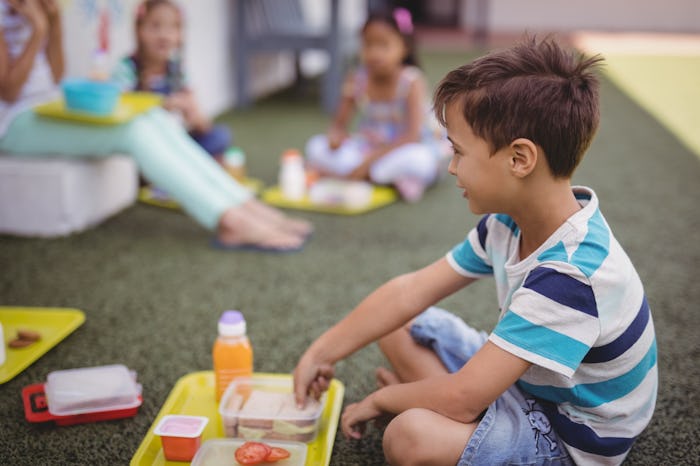Life

How Do I Keep My Food Allergic Kid Safe At School? Allergists Weigh In
Whether it's because of a picky toddler or sweets-obsessed threenager, the moment you became a parent it's made quickly apparent that food issues are a part of the gig. But, for some parents, it runs deeper than simply a child who won't eat his broccoli. Food allergies affect one in 13 children, or roughly two in every classroom, according to Food Allergy & Research Education (FARE). And when a child goes to school, it simply ups the ante on parental worry. But if you are wondering "How do I keep my food allergic kid safe at school?" then experts say they can help you jump some of the most common hurdles.
Teaching children about the consequences of their allergy — and how to find help if necessary — is the first step in making it easier to manage in a school environment, Dr. Sujan Patel, a pediatric allergist at Hassenfeld Children's Hospital at NYU Langone, says in an email interview with Romper.
“Working with the child to have them understand the reactions that can occur with ingestion of that food is the most important,” says Patel. “Positive reinforcement of the child speaking up to declare their food allergies can be empowering.”
Dr. Purvi Parikh, an allergist and immunologist with Allergy & Asthma Network, says in addition to teaching children about the warning signs related to allergic reactions, it’s also important that parents teach them how to use rescue medication, like an EpiPen or quick relief inhaler, that are needed in the event of an emergency.
“Children are quite bright and we see those even as young as 4 or 5 years of age able to advocate and self-administer,” Parikh tells Romper in an email interview. “Work with your doctor and child to see if they are capable of independently recognizing symptoms and self-administering.”
Common roadblocks in the classroom include accidental exposure by classmates giving a food allergic child the food they’re allergic to, says Patel. Some children — about one-third of kids with food allergies — have even reported being bullied as a result of their allergies, according to Food Allergy & Research Education.
Stacy Haynes, a chid psychologist and mother to a 10-year-old daughter with peanut allergies, says she always sends in a snack bag at the beginning of school so that her daughter can have options when unsafe treats are offered to other students. Haynes’ daughter also wears a necklace from Lauren’s Hope that identifies her allergy when she is in public, a step that Patel says is key to prevention.
Parikh also stresses the importance of making all people in the school equation — teachers, parents, the school nurse, and so forth — aware of your child's food allergies and what steps should be taken should a reaction occur. Medication should also always be readily available. “Again, empowering your child to recognize symptoms, advocate, and self-administer can prevent many of these roadblocks,” she says.
And maybe help ease your mom mind.